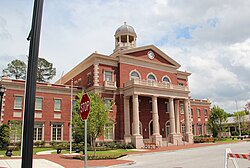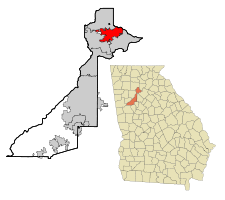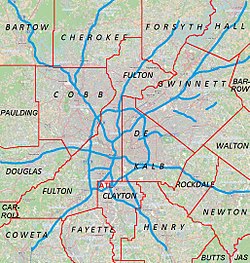Zip Code 30009
| Alpharetta, Georgia | |
|---|---|
| City | |

Alpharetta City Hall
|
|
 Location in Fulton County and the state of Georgia |
|
| Location of Alpharetta in Metro Atlanta | |
| Coordinates: 34°04′24″N 84°16′52″W / 34.07333°N 84.28111°WCoordinates: 34°04′24″N 84°16′52″W / 34.07333°N 84.28111°W | |
| Country | United States |
| State | Georgia |
| County | Fulton |
| Incorporated | December 11, 1858 |
| Government | |
| • Mayor | David Belle Isle |
| Area | |
| • Total | 27.3 sq mi (70.7 km2) |
| • Land | 26.9 sq mi (69.7 km2) |
| • Water | 0.4 sq mi (1.0 km2) |
| Elevation | 1,135 ft (346 m) |
| Population (2010) | 57,551 |
| • Estimate (2016) | 65,338 |
| • Density | 2,342/sq mi (904.4/km2) |
| Time zone | EST (UTC-5) |
| • Summer (DST) | EDT (UTC-4) |
| ZIP codes | 30004, 30005, 30009, 30022 |
| Area code(s) | 770, 404, 678 |
| FIPS code | 13-01696 |
| GNIS feature ID | 0310497 |
| Website | www |
Alpharetta is a city located in north Fulton County, Georgia, United States and is a suburb of Atlanta. As of the 2010 census, Alpharetta's population was 57,551. The estimated population in 2014 was 63,038.
In the 1830s, the Cherokee people in Georgia and elsewhere in the South were forcibly relocated to the Indian Territory (present-day Oklahoma) under the Indian Removal Act. Pioneers and farmers later settled on the newly vacated land, situated along a former Cherokee trail stretching from the North Georgia mountains to the Chattahoochee River.
One of the first permanent landmarks in the area was the New Prospect Camp Ground (also known as the Methodist Camp Ground), located beside a natural spring near what is now downtown Alpharetta. It later served as a trading post for the exchanging of goods among settlers.
Known as the town of Milton through July 1858, the city of Alpharetta was chartered on December 11, 1858, with boundaries extending in a 0.5-mile (0.80 km) radius from the city courthouse. It served as the county seat of Milton County until 1931, when Milton County was merged with Fulton County to avoid bankruptcy during the Great Depression.
The city's name is a variation of a fictional Indian girl, Alfarata, in a 19th-century song, "The Blue Juniata". The name of the city is also believed to have been derived from the first letter of the Greek alphabet.
...
Wikipedia



